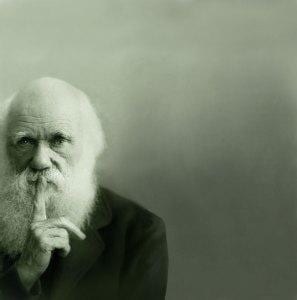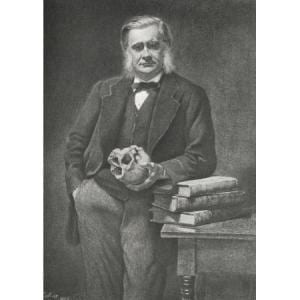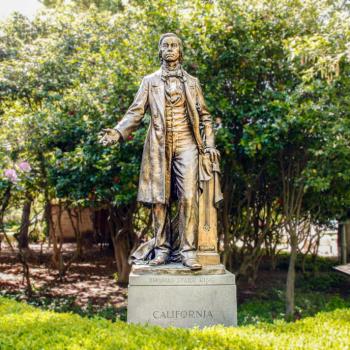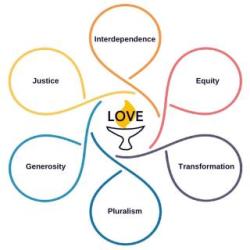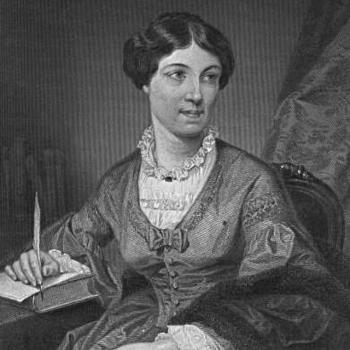CHANGE & NOT KNOWING
Darwin, Huxley, & the Shape of Naturalistic Religion
James Ishmael Ford
My “six-year old just got out of bed to tell me that here apple cores turn into soil & she can plant seeds in that soil to grow into apples. ‘Mommy, it’s a circle. You have to write that on the internet. What if they don’t know!’” Lynna Odel, found on the Internet
As I’m sure most here know, the 12th of February is Charles Darwin’s birthday. His two hundred and eleventh, this particular time around.
I believe this event has been noted here most every year for quite a few years. Gary has graced us with several reflections on Mr. Darwin and the doors he opened for us. The truth be told there are any number of ways we could reflect on that old worthy and his earth shaking as well as from one direction or another endlessly controversial articulation of his theory of evolution.
It’s something which on the face of it explains a whole lot about who we are. But in ways that can be enormously unsettling. His theory also opened a number truly ugly possible interpretations. So-called “social Darwinism” is one such blight on our human hearts, and human lives when applied. Something important to explore. Especially how it was based in a misunderstanding of what Darwin taught and that term he picked up from Thomas Mathus, “survival of the fittest.” We could profitably spend our time unpacking that term.
But today, here, I find the social and spiritual context in which he engaged his work is also worthy. I love the fact he was raised within the warm embrace of English Unitarianism. Unraveling this thread can be very helpful for us. I really believe.
Today, for me, and thinking about us here, I want to focus on the rise of naturalistic religion within our Western cultures. “Naturalist religion” is a term of art for spiritualities that do not appeal to supernatural explanation of things. Rather they seek meaning and purpose simplhy within the natural world.
And naturalistic religion is one of the most important facets of our received liberal spiritual tradition. Sometimes in UU congregations we can be unclear that we actually stand in a stream of thought and action. But in fact we are the product of much labor and suffering and reflection. And we’ve come up with a way of engaging life that, I think is astonishing.
I don’t actually think we all are terribly familiar with naturalistic religion, and what it might mean. So, I am going to hold up two aspects of naturalistic religion, one that can be derived from Charles Darwin’s observations, and another advocated by his principal defender in the day, Thomas Huxley. I think this can give us a very good picture of this near unique aspect of the living currents that inform our Unitarian Universalism.
Of course, we offer a number of good things. Unfortunately, one of those can obscure these gifts from our tradition. Recently when skimming through Facebook I saw a posting from someone who had seen a t-shirt that proclaimed: “Unitarian Universalism: My Bedrock Belief is that Your Opinion is as Good as Mine.” This is a witty version of the assertion that one may believe anything one wants and be a UU.
There is a certain truth to this. There is no test one must pass to join us, beyond some general sense of good will and willingness to put up with each other. And actually, we’re not the only people to have such a liberality of heart. I recall someone opining how an advantage of being an Anglican was that they could attend services for their whole lives without it impinging upon either their politics or their religion. Not meant entirely kindly, but it speaks to that openness of heart which marks liberal religions. As well as, perhaps, some of our shadows.
A fierce protection of individual freedom within our tradition is a particular hall mark of our way. In our Universalist heritage, which was fonder of creedal-like statements than our Unitarian forebearers, whenever a statement of faith was published, it always, always included what they called a “freedom clause.” That is no one would be removed for not toeing the theological line. There were occasional exceptions, but on balance the Universalists held to this fundamental sense of freedom of conscience. Our Unitarian forebearers went a step farther and resisted any creed, of any sort. Creeds would be any formal assertion of what one must believe to belong. That’s the “free” in the UU principal that calls us to a free and responsible search for truth and meaning.
Of course, there’s also the “responsible.” One aspect of responsible is noticing those paths that have been taken before and assessing whether they might be of assistance in those things that matter most in our lives today. Both our Universalist and our Unitarian traditions offer profound gifts to us as we make our free and responsible way.
Which sets up a critical point. For me religion has two major aspects to it. One is about cultural preservation; frankly, often no more than crowd control. It is the conservative and conserving aspect of one’s particular culture, often for good, frequently not so much, all of it given sanctity by whatever religious establishment has ascendancy. Obviously, that’s Christianity in most of the West. And, frankly, one reason we’re popular with those who do not or simply cannot color inside the lines of more traditional spiritual communities. But this is important as well. Wherever there is a dominant religion, it is hand in glove about preservation of the status quo.
But there’s that other function, and it is also found in all the religions. It is the quest for deepest meaning. It is our seeking perspective on life and death. It is about that quest for healing the hurt and longing that sits close to all human hearts. Today the principal religions are so often publicly so much about protecting aspects of culture that to most reasonable human beings are at best outdated, if not from the beginning pernicious. And they’re so loud about it that it’s hard to remember this other thing. This most important thing. Life giving spiritual quest.
I have an interest in noticing the crowd control part. To understand gives one perspective and opens ways of dealing with things. But I am passionately engaged in the paths of faith and meaning. And, we within the Unitarian Universalist movement have some genuine guidance for wounded hearts. Our own paths of faith and meaning.
What obscures that fact for us, often, is not because it gets lost in the din of telling people they are not good enough or pure enough one way or another. We can miss the guidance of our tradition because of the emphasis on how no one must believe what our tradition has actually figured out about life and suffering and love. Small irony. Well, maybe not that small.
There is, nonetheless, something on offer. Several things, actually. Possibly the more important, certainly for me, are the cluster of insights and pointers to be found within our Universalist heritage. Talked a little about that a couple of weeks ago. But, today, so close, as we are to Charles Darwin’s birthday, I want to hold up the strategies inherent within what we can call the Unitarian aspect of our tradition. As I noted earlier Darwin was profoundly informed by the English Unitarianism of his day. And, parts of what he figured out would touch that tradition and become a living part of what it is we offer here.
While the word “unitarian” has to do with the singularity of God, that has never been a major issue within our English-speaking Unitarianism. Rather, what has captured our hearts within this historical thread of liberal religion, is seeing the power of our minds. Over the years we’ve meant different things by that word mind. In fact, today, I find many UUs mean something similar to the Buddhist sense of mind as consciousness rather than the narrower sense of rationality.
But, also rationality, reason, the astonish human capacity to notice, reflect, and predict is very much a part of it. And, it is where what has come to be called Unitarianism has its origins. Noticing the power of observation, analysis, and, from that, prediction.
Amazing stuff that. And, so, it shouldn’t be surprising that one religion or another wouldn’t see it as something holy. In fact, during the European Enlightenment several did. The Deist religion that arose briefly within those powerful and dangerous times in the French Revolution is an example of one that burned bright, and like a fire of paper, extinguished itself leaving only a smudge on the historical record. More substantial approaches to reason in religion in England began to inform both the Established and the non-conforming traditions. Earliest Unitarians turned that faculty on the Bible, with sometimes devasting effect, and in other ways opening itt in new and unexpected ways. Good stuff. More than good stuff.
By the Nineteenth century it birthed the Unitarian movement in both the British Isles and on the North American continent. I don’t want to spend over long on the history of this. But, as I said, first was that rational analysis of the Bible. The second wave was an embrace of the intuitive parts of our human minds, Transcendentalism. They are deeply connected. And there would become a pendulum within the Unitarian movement, where the excesses of rational thought would swing to an embrace of intuitive thought, which would in time itself overreach, and there would be another reaction, this time swinging back to a more full embrace of facts on the ground and reflection from there. And so on. Swinging from one to the other.
But, there’s a sweet spot in all this. And, that returns us to the two great gifts of those early Evolutionary theorists, who articulated the critical elements of making sense out of this world in what for us would become a spiritual way. It is the place where the impulses of scientific inquiry become part of that quest for meaning and purpose.
And, we can see it first in good old Charles Darwin. I so love that he was raised within the Unitarian community. Although as a footnote to that footnote when it was obvious he wasn’t really interested in medicine, his father had the pragmatic sense to purchase at auction for his son, something you could do in that time and place, a tenured job as an Anglican priest. Something young Charles did not pursue. Fortunately for all of us. And, instead he found his passion in the observation of nature.
Along the way he, and others, principally Alfred Russel Wallace, realized much of what marked life, maybe everything, could be explained totally naturalistically by something he called “natural selection.” The gist is, while genetics had not yet been figured out, he observed that those a tiny bit better adapted to life in any given place, had a slightly better chance of having offspring. Those adaptive traits would continue in their offspring. And with that – evolution by natural selection. It isn’t survival of the fittest, it is survival of the most adaptive.
With that I’m not really interested in the controversies that followed and follow. Rather it is the most basic and fundamental of his observations that matter for me. And, I suggest, can matter for us as people on spiritual pilgrimages. Darwin noticed that there is a fundamental truth to things. They change. All things are mutable. Nothing escapes the flow of change.
Darwin stands within a moment in time, where in the West we were invited to notice nothing is forever. Everything is in flux. And, a lot of people listened. Of course, people have known this for a longtime and it is found in some other religions. It is axiomatic to Buddhism, for instance. But, for people of a spiritual bent in the West, this was an astonishing gift. It points to something critical to understand if we really want to understand the world, and within this world, us.
It tells us something about ourselves and the world, that if ignored, pretty much guarantees anything that follows will be wrong. Everything changes. So. Or one example. There is a Buddhist maxim, “the true self is no self.” Our selves, we, you, me, these selves exist, but only contextually. And there are enormous consequences With this understanding, within our naturalistic UU spiritualities if we want to find something true, we need to include that everything, person and thought. is fragile, temporary, true in a moment, but may not be so in another. As for us. We’re real. Real as a heart attack. But, as passing as morning dew. It’s all dynamic. We’re dynamic. Wild. We’re wild. And open. We, you and me, we’re open as the sky.
And that invites us to the other critical gift to us as spiritual seekers, and, hopefully, finders, we following a liberal religious tradition. Thomas Huxley. Huxley was a close associate of Charles Darwin. Darwin was an introvert and not given to debate. In fact, he hesitated even to publish the findings of his research knowing it would spark a fire storm. Huxley had no problem entering the fray. For his efforts eventually he earned the nickname “Darwin’s Bulldog.”
He was brilliant and part of a brilliant family. His grandfather Erasmus was a noted freethinker, his descendants included Aldous Huxley. But for today the most important thing to me about Huxley was a term he coined. He belonged to a small philosophical discussion group. And he quickly noticed everyone else had a term that summarized their philosophical or spiritual position. Christians, rationalists, advocates of various kinds of philosophy. He decided in his own words that he wanted a “tail like all the other foxes.” And so, he coined a term to describe himself, his tail. He called it “agnostic.” “A” as in not. And “gnostic” as in knowing. So, not knowing.
Today when one says they’re agnostic they usually mean they don’t know whether there’s a God or not. And, it usually implies they don’t really care, either. This wasn’t Huxley’s agnosticism. Actually, whether God exists was not a primary concern for him, although he saw no reason to postulate a deity. Huxley’s real challenge, and one that for most of us cut much closer to the bone, was that he challenged how we see ourselves. He was adamant that human beings did not exist outside the flow of events and their intimate interrelatedness.
Expanding on Darwin Huxley wrote, “In the whole universe there is nothing permanent, no eternal substance either of mind or of matter.” He felt any idea of an abiding self, an eternal individual “personality is a metaphysical fancy; and in very truth not only we, but all things in the worlds without end of the cosmic phantasmagoria, are such stuff as dreams are made of.”
Change. All things dancing together. In motion. And. And, critically, not knowing. Two great things. The first noticing that the world is in play. And that nothing is solid or forever. Digging in a bit we discover that within this great flux everything is connected. We can see patterns. We can find paths to walk. And of these many paths, the wisest appears to be humbly witnessing what is.
The poet and lay Zen teacher Joan Hirschfield famously observed: Zen pretty much comes down to three things: Everything changes; everything is connected; pay attention.” I think we can drop the word “Zen” here and, I suggest the great observations and the way through can be summarized as It, this, all of it pretty much comes down to three things for us human beings: Everything changes; everything is connected; pay attention.
The Wisdoms of the East and the Wisdoms of the West. The great Unitarian insight.
No one here needs to believe these observations to belong. But, like a small treasure chest kept in a closet, it waits. Those among us seeking a path, well, we offer one. All you have to do is go to the closet, take out that chest, and open it.
There you will find the secret teaching of the Unitarian stream of our Unitarian Universalism.
Everything changes; everything is connected; pay attention.
Amen.


